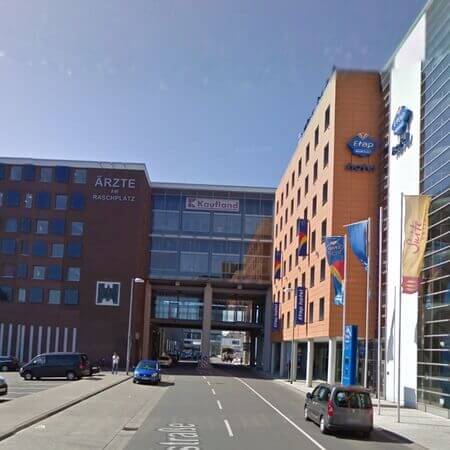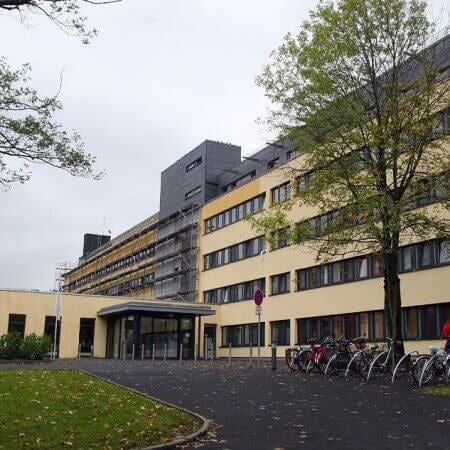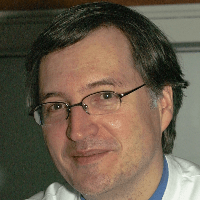Radiation therapy for lung cancer: treatment in the best hospitals in the world
Treatment prices are regulated by national law of the corresponding countries, but can also include additional hospital coefficients. In order to receive the individual cost calculation, please send us the request and medical records.

Gamma Knife and Radiotherapy Center
The Gamma Knife and Radiotherapy Center offers the full range of medical services in its field of competence. The treatment begins with an individual consultation and the comprehensive diagnostics, while the therapy is followed by all the necessary measures for follow-up care and consolidation of the result. The irradiation is carried out using the innovative Gamma Knife ICON, the characteristics of which ensure the successful removal of tumors up to 3 cm in size without damaging the surrounding healthy tissues. The highly qualified doctors of the center have many years of clinical experience and excellent skills in using this progressive system, so the patient can be sure that he will get the optimal result.



Gamma Knife and Radiotherapy Center
The Gamma Knife and Radiotherapy Center specializes in the stereotactic radiosurgical treatment and stereotactic radiotherapy for benign and malignant tumors of the head and neck, vascular malformations, as well as metastases in various organs (for example, in the liver, lungs, spine). The center has state-of-the-art equipment for stereotactic radiosurgery and stereotactic radiation therapy – Perfexion Gamma Knife and Axesse Linear Accelerator. The center also has innovative technologies of targeted radiotherapy, thanks to which healthy tissues can be completely removed from the radiation zone. At the same time, tumors and their metastases can be removed with an accuracy of up to 0,3 mm.



Department of Adult and Pediatric Radiation Therapy
According to the Focus magazine, the Department of Adult and Pediatric Radiation Therapy ranks among the top German departments specializing in radiation therapy! The department offers all types of modern radiation therapy for the treatment of various benign and malignant diseases. The focus is on multimodal interdisciplinary therapy of lung cancer, breast cancer, prostate cancer, sarcomas, malignant lymphomas and tumors in children. The stereotactic radiation therapy is available in the department for the targeted treatment of brain tumors. The department treats more than 1,500 inpatients and about 4,300 outpatients every year, which is the indisputable evidence of the outstanding quality of provided medical services.





Radiation therapy can be used for most types of cancer. A malignant lung tumor is no exception. During radiation therapy, radiation enters the patient's body, which destroys cancer cells. As a rule, the technique cannot be used as the main method. It only complements surgery and chemotherapy. For instance, Gamma Knife surgery in lung cancer is used for the treatment of metastases in the brain.
Application areas
Radiation therapy can be used in the following cases:
1. Early stage of lung cancer. The method is used as the main one if the patient is contraindicated in a surgical operation or he refuses it. The radiation therapy can sometimes cure cancer, but the effectiveness of this method is lower than that of a lung resection. In case of non-small-cell lung carcinoma, brachytherapy (contact radiation therapy) can sometimes be used at stage 0, as an alternative to surgery.
2. Before the surgical procedure. Most cases of lung cancer at the time of detection are inoperable. The tumors are too large and cannot be removed while maintaining sufficient lung volume for respiration. The radiation therapy combined with chemotherapy before surgery can sometimes reduce the size of the neoplasm. If successful, the doctor can remove the tumor, giving the person a chance to cure the disease.
3. After the surgical procedure. It cannot always be applied, since chemotherapy is the main method for relapse prevention after surgery. Consider the main situations where radiation can be used to destroy the remaining cancer cells:
- Stage 1 small-cell lung cancer – only if the resection margins are positive. If there are no malignant cells at the margins of the removed tissue, only chemotherapy can be used.
- Stage 2 small-cell lung cancer and further stages of this cancer usually cannot be operated.
- Stage 0 and 1 non-small-cell lung cancer does not require any additional treatment methods other than surgery.
- Stage 2 non-small-cell lung cancer is usually treated with surgery and postoperative chemotherapy, while radiation therapy can be used only in the case of positive resection margins.
- Stage 3 non-small-cell lung cancer can rarely be operated, but if the operation is performed, it should be followed by radiation and chemotherapy.
4. Prophylactic cranial irradiation. It can be used only for small-cell lung carcinoma. It can very often spread metastases to the brain. At the time of detection of the disease, the spread of the tumor into the central nervous system is already possible. Even if MRI cannot detect metastases, they can be very small at the time of the examination. Therefore, cranial irradiation is carried out for preventive purposes. It is always done at the initial stage of cancer if the patient is operated. In advanced, inoperable stages, prophylactic cranial irradiation is optional. Nonetheless, it is often used to increase a person's life expectancy and prevent the growth of metastatic tumors in the brain.
5. Inoperable lung cancer. The main treatments usually include chemotherapy, targeted therapy and immunotherapy. Radiation therapy can be used in addition to them or instead of chemotherapy, if it is contraindicated to the patient. The radiation helps to inhibit the growth of the tumor and reduce the main symptoms (pain, bleeding, coughing and difficulty swallowing).
6. Lung cancer metastasis. Radiation therapy can be used to irradiate metastatic foci in the bones, brain or other areas, to reduce their size.
External beam radiation therapy
To treat lung cancer, the doctors mostly use external beam radiation therapy. When carrying out this type of therapy, the radiation source is located outside the patient's body and acts on it from a certain distance. In the classic version, the procedure is similar to an x-ray. It is painless for the patient. The only difference is the precise guidance of the beams to the tumor at a higher dose of radiation.
The radiation procedure lasts only a few minutes. Typically, the patient attends radiation therapy sessions repeatedly. He is irradiated 5 days a week, with a break for the weekend. The course of treatment lasts an average of one and a half months.
The world's best Cancer Centers use more advanced radiation methods. They are more efficient and safer because they direct more radiation to the tumor and less to healthy tissues. These techniques also require fewer sessions. Here are some new options of external beam radiation therapy:
Stereotactic body radiation therapy. It is also called stereotactic ablative radiotherapy. It is mainly used for the radical treatment of early stage tumors if surgery is contraindicated, as well as for the destruction of metastatic foci in the brain and adrenal glands. When conducting therapy, the high-dose focused beams are used. In total, the patient requires from 1 to 5 procedures. The beams are directed at the tumor at different angles to reduce damage to healthy tissues and side effects.
3D conformal radiation therapy. This radiation technique is based on volume planning. The doctors consider the location of the tumor in three-dimensional space.
Intensity-modulated radiation therapy. It is the same as 3D conformal radiation therapy, but it allows for the further modulation of the intensity of the radioactive rays so that some parts of the tumor receive more radiation. This is the most sparing technique that can be used when the neoplasm is located near functionally important organs (for example, near the spinal cord).
Volumetric modulated arc therapy. It is a variation of the previous technique. It is equally effective and safe. In addition, it allows for a quick irradiation, in just a few minutes.
Radiosurgery. Gamma Knife procedure for lung cancer is a special type of radiation therapy, in which a large dose of radiation that destroys the tumor is used within a single session. Gamma Knife lung cancer treatment is mainly used in metastatic brain damage, if single or multiple small metastases are detected in it. Gamma Knife surgery for lung cancer itself is not used, as the Gamma Knife system is designed for interventions of brain and spinal cord.
Contact radiation therapy
In case of contact radiation therapy, the radiation source is injected directly into the area of the tumor. This type of treatment is called brachytherapy. It is not very common and doctors mainly use it to treat non-small-cell lung carcinoma.
The essence of the method is that radioactive seeds are introduced into the area where the tumor is located. Sometimes they can give strong radiation. In this case, they are placed only for several minutes, and then removed. There is also a technique, in which seeds give weak radiation. The radiation reserve is depleted in a few days. The radiation source remains in the patient’s body forever, but after a while it no longer poses a health hazard. This method is also applied in patients with prostate malignancies.
Here are some of the methods of radioactive seed introduction:
- With bronchoscopy, usually in case of advanced cancer to reduce the symptoms of the disease
- During the surgical procedure to remove lung cancer, in order to destroy the remaining cancer cells and prevent the recurrence of the disease
Treatment abroad with the Booking Health company
To undergo a course of radiation therapy, including treatment with Gamma Knife for lung cancer with brain metastases, you may use the services of the Booking Health. The company offers the following benefits:
- Selection of the best clinic, which specializes in the treatment of lung cancer and achieves the best results in this field of oncology.
- Reduced cost of medical services up to 50% due to the lack of overpricing and additional coefficients for foreign patients.
- Making an appointment on the most suitable dates for you.
- Preparation of the program taking into account the previously performed tests.
- Establishment of communication directly with the doctor of the Cancer Center.
- Monitoring of all stages of the program.
- Control of invoicess, return of unspent funds.
- Buying and forwarding medicines.
- Organization of additional diagnostic or therapeutic procedures.
- Communication with the clinic upon treatment completion.
The Booking health company will provide you with top-class services. We will book airline tickets and a room for you at the hotel closest to the Medical Center, arrange transfers from the airport to the clinic and back.

